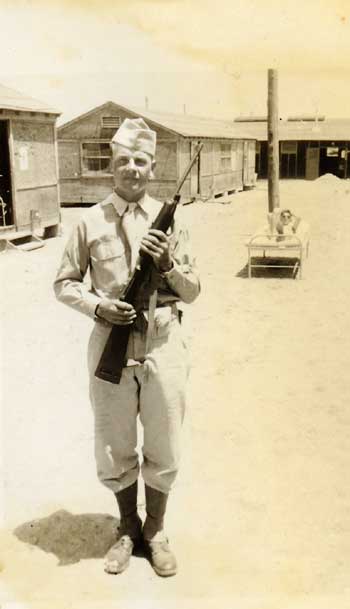

This is Raymond "Pappy" Cromer, from North Carolina, who was frightened of snakes in Texas. One night, while sleeping, a bramble pricked him and he came crashing through woods telling me to cut off his ear, he'd been bit by a snake. He would have thanked me if I had done it, but we went back to where we sleeping and found the bramble. He was sort of a timid, worried guy but a good fellow and got wounded seriously with everyone else on the first day of action at Herrlishiem. Both "Pappy" and I were young looking, and I was always conscious of this when we were around tough soldiers who'd just returned from North Africa.
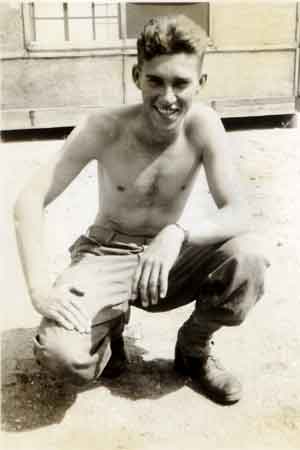
This is John Tedrowe, in front of our barracks at Camp Barkeley, who was later wounded a number of times in Europe. We shared a lot of time together, and both went to Texas A&M in the Army Specialized Training school. He was a sergeant and a bullet went through his shoulder while leading an attack in a battle about two weeks before the end of the war. After the action I remember talking to him while he was sitting wounded. He was sent to Korea after the war. I located him through his brother in 1990 and he now lives in Stone Mountain, Georgia.
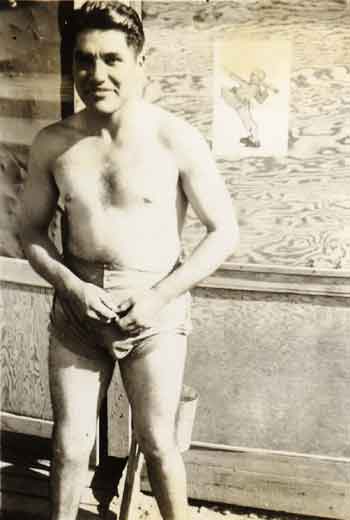
This is Phil Colunga, our half track driver, who now lives in Los Angeles. I was co-driver, and we spent a lot of time together. He was Hispanic, which was unusual in our unit. Hinajosa was the only other Hispanic I recall. I visited Phil in 1949 and he was working in a lime pit trying to support his family. He had a beautiful wife and family, but it seemed like a very hard life. He gave me a sack of oranges from a tree in his back yard.
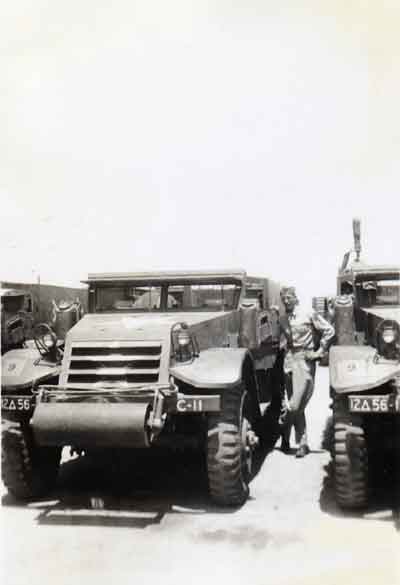
This photograph shows me standing next to our half track. The bumper reads"C-11", which means the eleventh half track in C company. This was our half track in Texas, for about a year before we were shipped to Europe. As co-driver I was trained to drive it, but I was terrible and burned the clutch. The squad liked this as it made our half track easy to find in the woods during maneuvers, because it smelled like burnt clutch. A half track was cavalry, and used the same sort of tactics. There were eight members of a mortar squad, which I was in, but twelve in all other squads. This made fifty five men in a platoon. During action, the drive and sometimes the assistant driver (who manned the anti aircraft machine gun) stayed back with the equipment, in the same way in the old cavalry, one cavalry soldier remained with the horse while the other members went foreword. By chance, this saved my life on the first day of Herrlishiem, where only Phil and I remained unwounded. This is the only time I recall staying back, and I lasted another two weeks before being wounded.
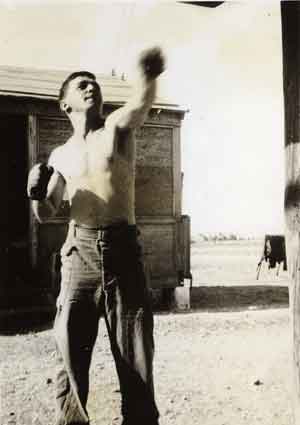
John Pamoto was a small guy, and a boxer. He's practicing with a punching bag, which I knew how to practice with as my dad had set one up in the basement of our Seattle home. John was one of the "old timers" in the company, probably 20 or older. I arrived at Camp Barkeley from the Army Specialized Training Program with 55 others, all of us 19 years old and there was a split for awhile between the "college boys" and the "old timers".